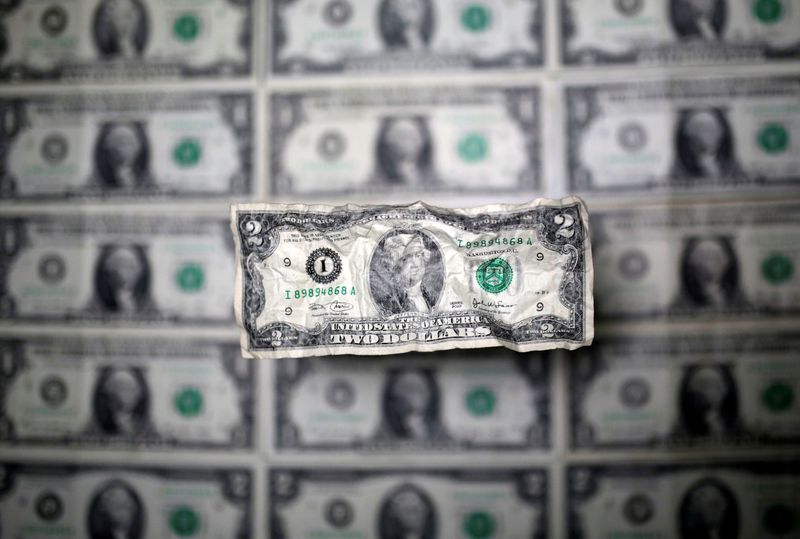 © Reuters. U.S. dollar banknote is seen in this picture illustration taken May 3, 2018. REUTERS/Dado Ruvic/Illustration/File Photo
© Reuters. U.S. dollar banknote is seen in this picture illustration taken May 3, 2018. REUTERS/Dado Ruvic/Illustration/File Photo
By Rae Wee
SINGAPORE (Reuters) - The dollar rose broadly on Wednesday and stood near a two-week high against its major peers, underpinned by a confluence of factors including elevated U.S. Treasury yields and a cautious turn in risk sentiment that weighed on Wall Street.
Trading was thinned in Asia with Japan out on a holiday, and with investors still returning from an extended New Year break, currencies traded mostly sideways in early deals.
However, the New Zealand dollar, often used as a proxy for risk appetite, slid to a two-week low of $0.62485.
The Australian dollar likewise hit a two-week trough of $0.6756.
The U.S. currency was broadly firm, enjoying some respite after having fallen 2% last month and clocking its first yearly loss since 2020.
A surge in risk appetite at the end of last year - sparked by a dovish tilt in the Federal Reserve's December policy meeting which further fuelled bets for U.S. rate cuts in 2024, had toppled the greenback and sparked a rally in Treasuries and stocks.
That, however, failed to carry on into the New Year, with a bout of risk aversion causing the S&P 500 and Nasdaq Composite to close their first trading session of 2024 lower, dragged down by big tech names. [.N]
"We've just seen quite a significant reversal in risk sentiment in the last 24 hours," said Ray Attrill, head of FX strategy at National Australia Bank (OTC:NABZY) (NAB). "Higher U.S. yields, weaker U.S. stocks equals stronger dollar. I think that's the simple story."
"The kiwi dollar, which has been one of the more risk-sensitive currencies, has sort of underperformed versus most other currencies as well," said Attrill.
A broadly stronger dollar also weighed on the euro and sterling, which had, on Tuesday, clocked their worst daily performance in months.
The euro was last at $1.0949 after having lost 0.95% on Tuesday, its largest daily decline since July last year.
Sterling similarly wobbled near a three-week low and changed hands at $1.2630, having slid 0.87% in the previous session, its sharpest daily fall in nearly three months.
The dollar index hovered near a two-week peak and was last at 102.15 after having jumped 0.86% on Tuesday, which marked its best daily performance since March 2023.
The greenback was underpinned by a rebound in U.S. Treasury yields, which saw the benchmark 10-year yield hitting an over two-week high in the previous session. [US/]
Cash trading of Treasuries in Asia was closed on Wednesday given the holiday in Japan.
Elsewhere, the yen was little changed at 141.98 per dollar, after falling nearly 0.8% in the previous session.
Analysts said the risk-off mood was also in part driven by concerns over escalating geopolitical tensions, after Israel killed Hamas deputy leader Saleh al-Arouri in a drone strike in Lebanon's capital Beirut on Tuesday.
"I suspect that markets (are) starting the year with finding it hard to completely ignore geopolitics," said NAB's Attrill.

